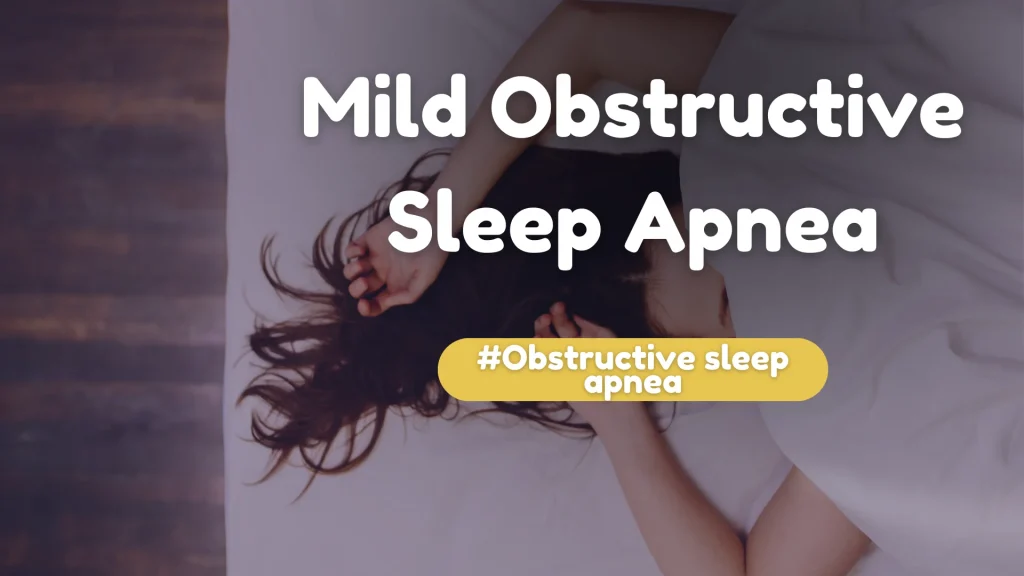Posted on Saturday, June 15th, 2024 at 4:16 pm
Sleep is the foundation of our health and well-being, yet for millions of Americans, achieving restful sleep remains elusive due to a condition known as mild obstructive sleep apnea (OSA). While often overlooked, this sleep disorder can significantly impact one’s quality of life.
Defining Mild Obstructive Sleep Apnea
Mild OSA occurs when your airway partially or completely closes during sleep, causing brief pauses in breathing. These pauses, called apneas, can happen multiple times per hour. For a diagnosis of mild OSA, you typically experience between five and 15 apneas per hour of sleep.
During an apnea event, your body struggles to breathe, often leading to a brief awakening. While you may not remember these awakenings, they disrupt your sleep cycle and prevent you from reaching the more profound, restorative stages of sleep.
Recognizing the Signs
Mild OSA often flies under the radar, as its symptoms can seem innocuous or be attributed to other factors. Recognizing these signs proves crucial for early intervention, however. Common indicators include:
- Loud or frequent snoring
- Gasping or choking during sleep
- Daytime fatigue or sleepiness
- Morning headaches
- Difficulty concentrating
- Mood changes or irritability
- Dry mouth or sore throat upon waking
If you notice these symptoms in yourself or a loved one, seeking professional evaluation can help determine if mild OSA plays a role.
The Impact on Your Health and Daily Life
While “mild” might suggest minimal consequences, even mild OSA can wreak havoc on your overall health and well-being. The repeated disruptions to your sleep cycle can lead to a cascade of effects that ripple through your daily life.
Daytime Functioning:
Mild OSA often results in excessive daytime sleepiness, making staying alert and focused throughout the day difficult. This fatigue can impair work performance, affect driving ability, and diminish overall productivity.
Cognitive Function:
The lack of quality sleep associated with mild OSA can impact your cognitive abilities. Consequently, you may experience difficulties with memory, problem-solving, and decision-making. As a result, this “brain fog” can frustrate you and hinder both your professional and personal growth.
Mood and Mental Health:
Sleep deprivation from mild OSA can contribute to mood swings, irritability, and an increased risk of depression and anxiety. The constant fatigue can strain relationships and diminish your overall quality of life and mental health condition.
Physical Health:
Even in its mild form, OSA places stress on the cardiovascular system. Over time, this can then increase the risk of high blood pressure, heart disease, and stroke. Additionally, disrupted sleep patterns can affect metabolism, potentially leading to weight gain and insulin resistance.
Diagnosing Mild Obstructive Sleep Apnea
If you suspect you might have mild OSA, seeking a proper diagnosis marks the first step towards better sleep and improved health. Your healthcare provider may recommend a sleep study to evaluate your breathing patterns and oxygen levels during sleep.
Home Sleep Tests:
Advancements in technology have made it possible to conduct sleep studies in the comfort of your own home. For the most part, these tests typically involve wearing a small device that monitors your breathing, heart rate, and oxygen levels throughout the night.
In-Lab Sleep Studies:
For a more comprehensive evaluation, your doctor might recommend an overnight stay in a sleep lab. In this case, a polysomnography test will provide detailed information about your sleep stages, brain activity, body movements, and breathing patterns.
Treatment Options for Mild Obstructive Sleep Apnea
Once diagnosed, mild OSA can be managed using several options. The proper treatment approach depends on your circumstances and preferences.
Lifestyle Modifications:
For some individuals with mild OSA, simple lifestyle changes can make a significant difference:
- Weight loss
- Positional therapy
- Avoiding alcohol and sedatives
- Establishing a consistent sleep schedule
Oral Appliance Therapy:
Custom-fitted oral appliances, similar to mouthguards, can effectively treat mild OSA. These devices gently reposition your jaw or tongue to keep your airway open during sleep. Therefore, many patients find oral appliances comfortable and easy to use, making them a preferred alternative to more invasive treatments.
CPAP Therapy:
Continuous Positive Airway Pressure (CPAP) machines deliver a steady stream of air through a mask, keeping your airway open throughout the night. While often associated with more severe cases of OSA, some individuals with mild OSA may benefit from CPAP therapy, especially if other treatments prove ineffective. However, using CPAP can have side effects, like claustrophobia and dizziness.
Surgical Options:
Structural nose, throat, or jaw complications may contribute to mild OSA. Therefore, surgical interventions to address these issues can sometimes alleviate symptoms.
The Importance of Ongoing Management
Managing mild OSA requires a commitment to your health and well-being. Regular follow-ups with your healthcare provider ensure that your treatment remains effective and allow for adjustments as needed. As you address your sleep apnea, you may notice improvements in various aspects of your life:
- Increased energy and alertness during the day
- Enhanced mood and emotional stability
- Improved cognitive function and productivity
- Better overall health and reduced risk of associated conditions
Remember, even mild OSA deserves attention and proper management. By addressing your sleep apnea, you invest in your long-term health and quality of life.
Contact Our Sleep Disorder Professionals Today
If you suspect you might have mild OSA or simply want to improve your sleep quality, don’t hesitate to seek professional guidance. The team of West Babylon sleep specialists at Silent Night Therapy specializes in sleep disorders and offers comprehensive evaluations and customized treatment plans. Take the first step towards better sleep and improved well-being by contacting Silent Night Therapy today. Call 631-983-2463 to schedule your consultation and embark on your journey to restorative sleep and vibrant living.

